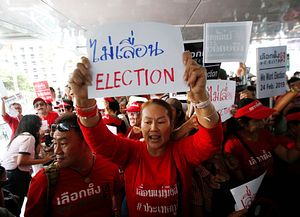In 2019, Thailand may finally hold the elections its military government has continually punted further down the road since the 2014 coup. But given the new military-backed constitution, do the polls even matter? The established political order – centered on the trifecta of the monarchy, the military, and the bureaucracy – has a lot riding on the outcome, and may not be willing to leave the results in the hands of Thailand’s people.
So what does the future look like for Thai democracy? Pavin Chachavalpongpun, associate professor at Kyoto University’s Center for Southeast Asian Studies, provides some much needed context for Thai political developments in this interview with The Diplomat.
The current political transition Thailand is undergoing, which dates back to the time of former Prime Minister Thaksin Shinawatra back in the 2000s, has often been framed as growing popular challenges to the established political order anchored around the monarchy, military, and bureaucracy. As we enter 2019, what does that bigger picture look like?
The power struggle, erupting in the 2000s, has continued to shape the Thai political landscape, which suggests the persistent nature of the conflict. Throughout the past two decades, the political fault line has partly been drawn on the role of the monarchy, considered the most revered institution. Thaksin, in self-exile overseas, has remained hugely popular among his supporters in far-flung regions. Now in 2019, even as Thaksin is unable to return home, he still casts a long shadow over Thai politics, particularly during this crucial period leading up to the election.
This will also be the first election under the new reign of King Vajiralongkorn, and therefore the political stakes are high for both the old establishment camp and the Thaksin faction. The old established political order has lost its spell since the death of King Bhumibol Adulyadej in 2016. The decline of the established political order coincided with the domination of politics of Thaksin made possible by his populist policies. Thaksin’s successful populist policies directly challenged the old power. This prompted agents of the establishment, including the military and the judges, to intervene in politics in order to maintain the status quo. The 2019 election is inevitably a contest of the two divided factions over the defense of what are meant to be the interests of the old establishment versus those of the people.

































